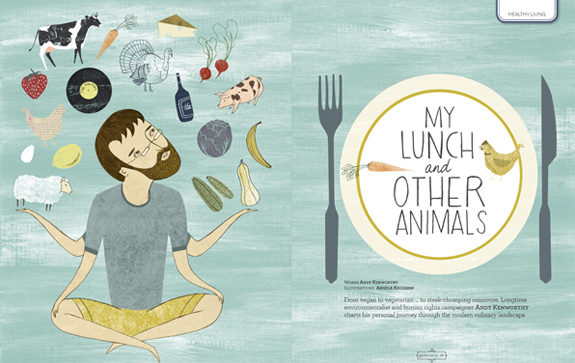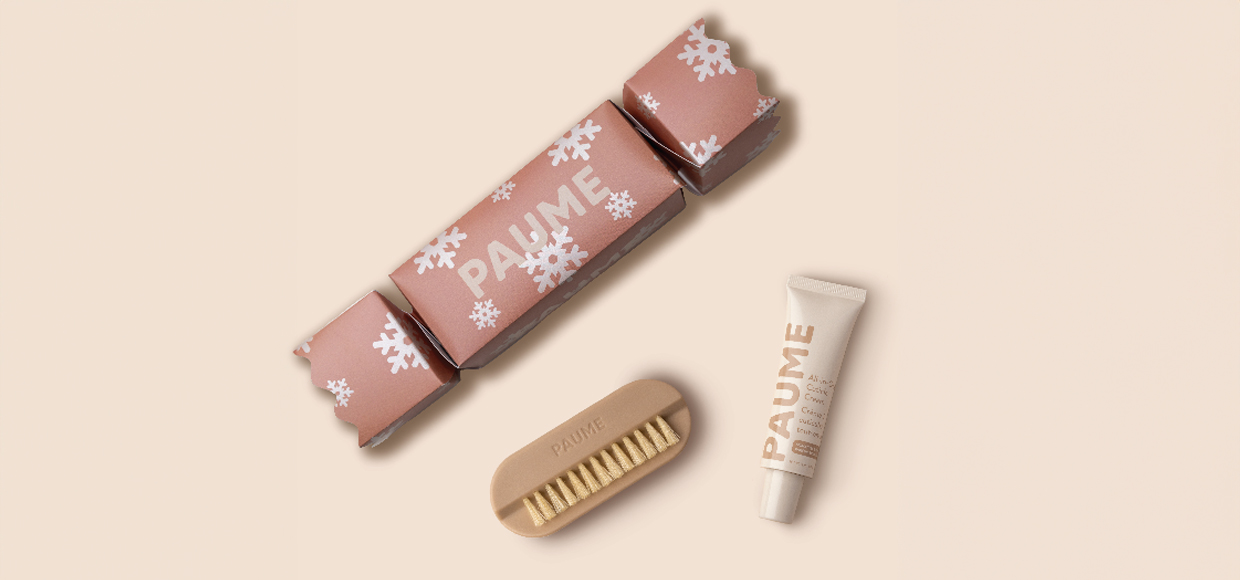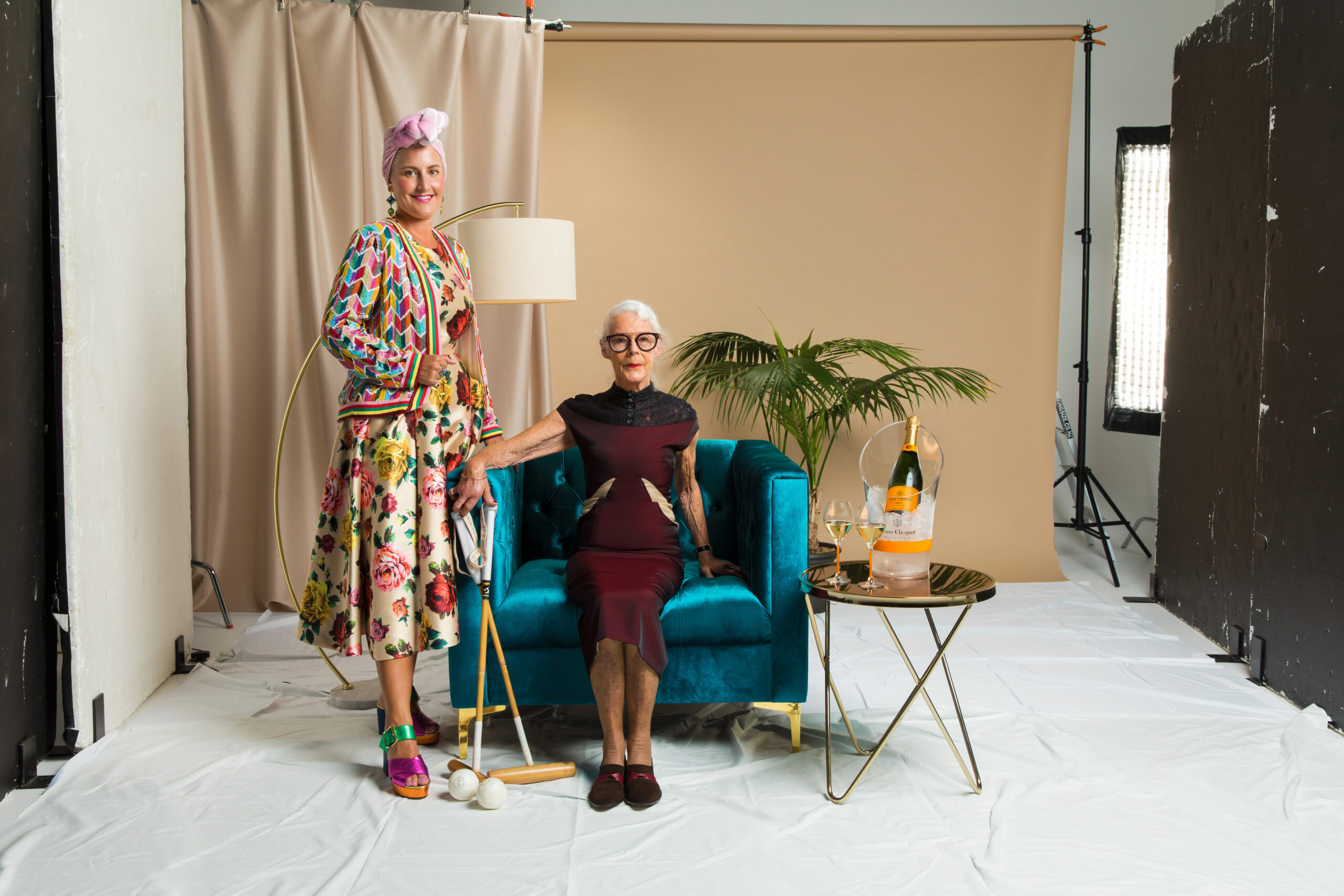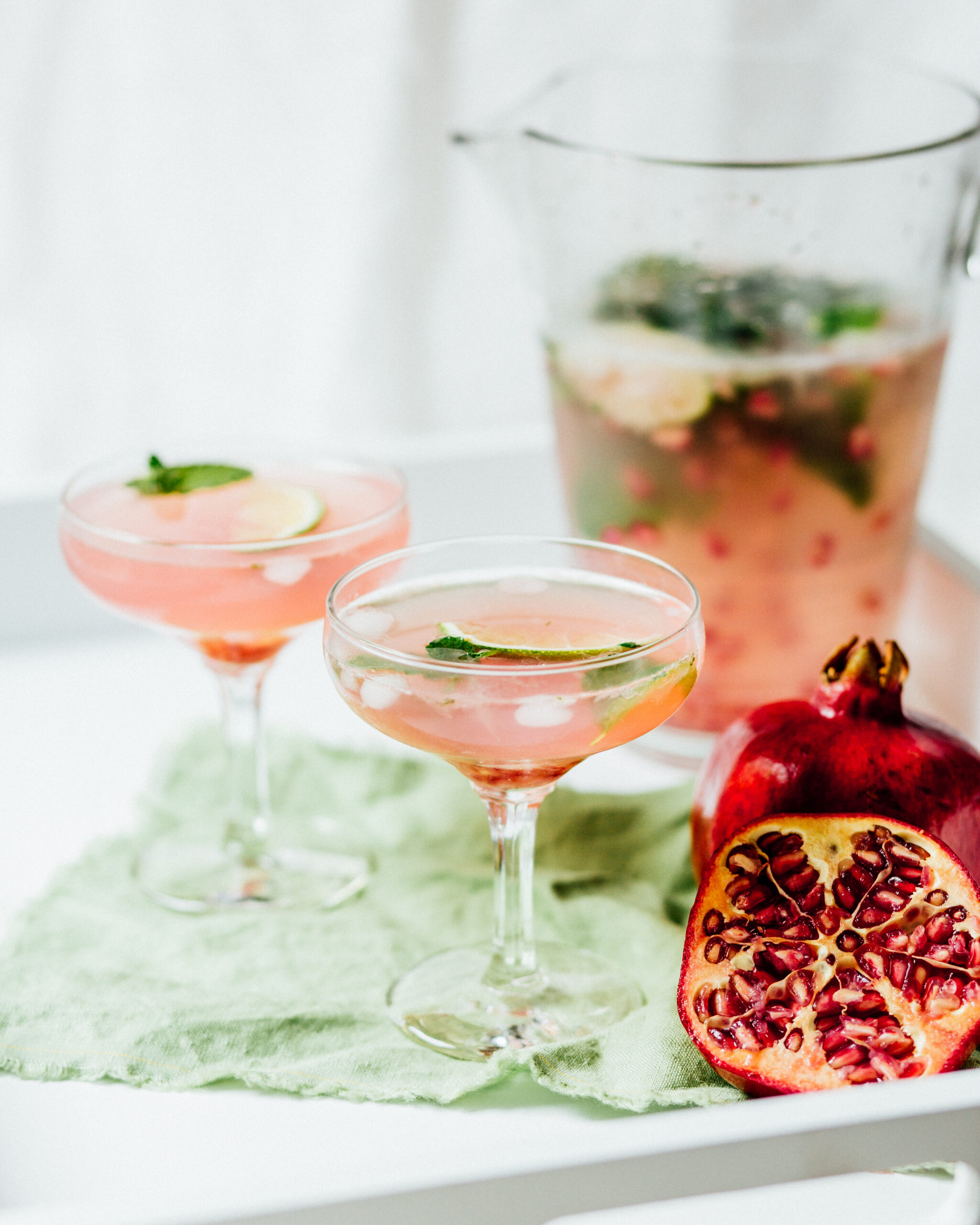From vegan to vegetarian … to steak-chomping omnivore. Longtime environmentalist and human rights campaigner Andy Kenworthy charts his personal journey through the modern culinary landscape
From vegan to vegetarian … to steak-chomping omnivore. Longtime environmentalist and human rights campaigner Andy Kenworthy charts his personal journey through the modern culinary landscape
Illustrations by Angela Keoghan
I started eating dead animals again just before Christmas, after 14 years of avoiding meat almost entirely. It had been on my mind for a while. I eventually crossed the line when my vegetarian wife Fiona couldn’t face veggie sausages or tofu while pregnant with our second child and subsequent blood tests showed she was severely iron deficient. On a weekly date night out at Lone Star, I joined her for a big juicy steak. I enjoyed the evening and several more meaty meals out, and after a few weeks of indulgence I had a subtle sense that I felt more alert, like I fitted more snugly into my skin.
It got me thinking. In the past couple of years I’d started to feel the cold more acutely than before, suffered from general brain fog most mornings and seemed to catch more than my share of minor illnesses. I’d put this down to raising a toddler, overdoing my running training and too many late nights toiling at the computer screen.
I thought I might have been iron deficient as well, but blood tests didn’t bear this out. However, one detailed diet analysis suggested I was eating only about a third of the protein I needed.
I went on enjoying my meat for a few more weeks while chewing all this over. The taste! The choice! The sudden ability to build a meal with relative ease! I fitted in with ‘normal’ folk indulging in barbecues and felt satisfied without having to graze all day. I felt I was giving myself a break, and relished it.
Looking back on when my vegetarianism began, I was in my early 20s, struggling to emerge from the long shadow of my father’s death, a bullied childhood and fairly typical teenage disappointments. I drank a lot of real ale, packed up my Smiths records, a grab-bag of Eastern philosophy, neo-paganism and popular science and struck out for what I believed was the moral high ground.
A couple of decades down the track, the armour of moral certitude I invented back then had got a bit tatty. But along the way it had become a crucial part of what defined me as an ethical, health-conscious writer specialising in global sustainability. So my changing approach to food also became a moment to ask myself some difficult questions about all that as well.
Can eating meat be ethical?
It seems to me the more like us something is, the more likely sane people will have a problem with killing, or being cruel to it. It explains why some vegetarians say emotive things like: “I never eat anything that has a mother.” It’s also why you don’t need counselling after swatting a fly, but might if forced to kill a beloved pet or stab someone to death with a bayonet. This has become an important moral impulse that helps regulate anti-social behaviour and binds families, communities and nations together. My reading of Hinduism and Buddhism takes these ideas further. Central to both religions is the concept of ahimsa: kindness and non-violence towards all living things, which are seen as interconnected and desiring freedom from suffering.
And popular science tells me how signs of intelligence, self-awareness, and teamwork – once considered the exclusive preserve of humanity – are now increasingly found in animals. This suggests to me that many human rights should also be extended to them – and it’s what makes it hard for me to entirely justify meat-eating on ethical grounds.
Then again, I can’t entirely justify using this computer either, considering the pollution and exploitation related to it, or driving a car, or the amount of money I earn, or buying imported nuts and seeds in a plastic bag from the supermarket.
For some hardcore vegans, killing animals is not an issue they want to compromise on. While I sympathise with that, I’m now more interested in finding the most practical and positive compromise that takes into account all of the other factors involved.
Can eating meat be healthy?

If I knew the optimum diet for humans, I wouldn’t be working today! The debate is wide-ranging and incorporates how well adapted the human species is to eating meat (over what’s believed to be more than 3.4 million years of human meat-eating) as well as mind-bendingly complex information on dentistry, enzymes and digestion chemistry.
What is clear to me is that humans are an omnivorous species that can eat and digest a wide range of foods, including meat. And the optimum choice of how much meat you should eat, if any, in what kinds and in what combinations depends on your individual metabolism, life stage, tastes, upbringing, lifestyle and more.
Interestingly, the healthiest I’ve ever felt was when I was vegan for a couple of years. Maybe I just wasn’t working as hard, or it had something to do with not having small children bringing new bugs to my home, but I don’t remember getting ill once, not even a cold. A plant-based diet ruled out most of the junk, and I just didn’t feel like eating it anyway. By contrast, while I was vegetarian, I was always tempted to eat too much cheese, cake, biscuits and chocolate to fill me up.
For me this means that if I do continue to eat meat I have to be careful it’s a carefully measured and monitored addition to the healthy eating habits I’ve developed, not a total surrender to a fast-food TV McDinner lifestyle. Modern, industrialised agriculture exacts a heavy environmental toll. The question is how we turn back this tide of destruction. A post-climate change, post-Peak Oil society based on vegan agriculture where animals are not farmed for human consumption sounds idyllic. But is it achievable, or even desirable?
I believe sustainable systems like permaculture, organic farming and biodynamics offer a way forward. They all rely heavily on animal manure for fertiliser. They also use animals to control pest species without resorting to chemicals, as well as to turn waste and unpalatable plants back into food for people. I can’t see how we could do without all this and create an acceptable, let alone pleasant standard of living, especially in areas with marginal soils or climate.
So, where’s my next meal coming from? As both a vegan and a vegetarian I found it hard to source all my food locally, or even nationally – let alone produce it myself. Instead I ended up buying a lot of imported foods, processed stuff, packaged supplements and out-of-season vegetables to fill up the larder. Veggie friends will say that I could still be vegetarian or vegan if I wanted to, if I got organised enough, ate more of this or that, took this or that supplement.
And they’re right.
But the truth is that after 14 years of trying to remember my spirulina, multivitamins and B12 supplements while also soaking things overnight and sprouting them on my windowsill I think I can safely say I am just not that organised, and I am not sure I want to be. It seems to me that sustainability advocates must factor in what real people are capable of sustaining. For our own health, and the health of our planet, it’s obvious that the human race needs to eat less meat. But I no longer believe that means abandoning it altogether.
I don’t want to revert to ‘meat and two veg’, or highly processed convenience foods. But I do want to use carefully sourced meat as part of a healthy, sustainable diet. This means high-quality, home or locally made, free range, and local food that includes plenty of salads, greens, beansprouts and fresh juices. It also means having more animals around my home. Two chickens now supply all our eggs and I hope to introduce more animals into our daily lives to help build a more resilient household for my family.
To be an omnivore with a clear conscience I need to ensure the animals I eat live good lives, die a death free from suffering and fear, and that their passage to my plate has improved the sustainability of my lifestyle. I think the development of new approaches to animal husbandry can make this possible, and I want to support them.
Now there’s a challenge I can get my teeth into!







